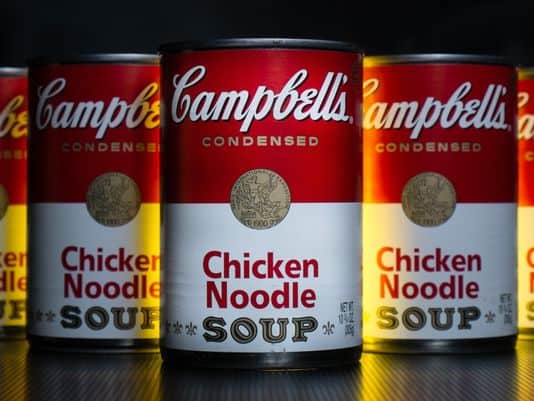
Campbell Soup plans to pursue a sale of its international division and its Campbell Fresh unit as the company seeks a turnaround amid declining soup sales and turmoil for the packaged foods industry.
The food giant announced Thursday that it would refocus its strategy primarily on the North America market in snacks, meals and beverages.
The moves include a plan to sell the Bolthouse Farms and Garden Fresh Gourmet brands, as well as the company’s refrigerated soup products. Bolthouse Farms makes healthy drinks and was acquired in 2012, while Garden Fresh Gourmet makes hummus and salsa and was acquired in 2015.
Remaining brands will include the company’s namesake soup, as well as Goldfish crackers, Pepperidge Farm cookies, Snyder’s of Hanover pretzels and V8 drinks.
After the sudden exit of CEO Denise Morrison earlier this year, Campbell Soup is trying to get traction amid a cultural shift away from packaged foods and toward natural ingredients and prepared foods.
Campbell Soup also reported Thursday that fiscal fourth-quarter sales when excluding acquisitions and one-time factors fell 3 percent for the quarter.
A 14 percent drop in U.S. soup sales, when excluding a recent acquisition, drove much of the overall decline.
The company’s profit tumbled 70 percent to $94 million.
A recall of Goldfish crackers after a salmonella scare also hurt the company’s sales and bottom line.
After Thursday’s announcement, S&P Global Ratings lowered Campbell Soup’s credit rating from BBB to BBB-, reflecting a reshaped company that’s “less diversified and more dependent on its poorly performing but higher-margin soup business to fund growth in its large snack segment.”
The company, which is also under pressure to shed unnecessary expenses, said Thursday that it would cut an additional $150 million in costs. That will include “continuing to optimize its manufacturing network.”
Campbell Soup had already announced plans to cut $500 million in costs and pursue $295 million in savings from its acquisition of snack maker Snyder’s-Lance. The goal is to achieve those cost cuts by the end of its 2022 fiscal year.
The food giant said it had hired financial advisers to seek buyers of its Campbell International and Campbell Fresh businesses. That includes physical operations in Indonesia, Malaysia, Hong Kong and Japan.
Taken together, the assets up for sale have 2018 sales of about $2.1 billion.
Campbell Soup interim CEO Keith McLoughlin said the company also considered splitting or pursuing a sale of the entire operation.
“Our new leadership team will concentrate on significantly improving operational discipline through a rigorous management model that aligns the enterprise from strategy through execution,” McLoughlin said in a statement. “We are moving forward with a sense of urgency to complete these changes in fiscal 2019, setting the foundation for sustainable, profitable growth in fiscal 2020 and beyond.”
























